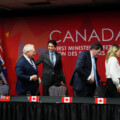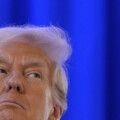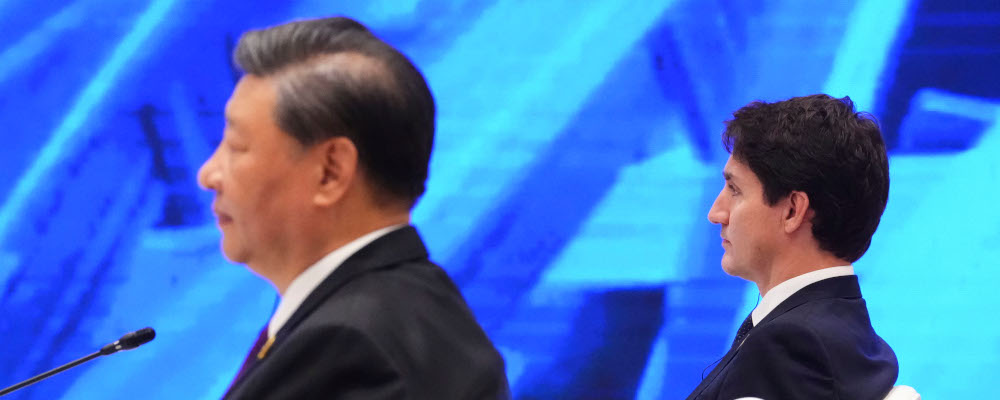Almost every day brings an ominous news article about China and its relationship with Canada and its allies. Usually framed as a confrontation between a democratic, rights-respecting West and China as an authoritarian human rights abuser and destabilizer of world order, the relationship appears to be on a one-way downward track, beset by hostility and mistrust, with a looming, perhaps inevitable military conflict at its conclusion. The current political discourse and media coverage are almost exclusively focused on the dangers of a newly rising China.
Both sides have far too much to lose if this belligerent tone continues. Canada has much to gain if we take prudent steps to protect our interests yet leverage the benefits of the relationship. With 1.4 billion people, China presents Canada with enormous opportunities but also acute problems; we should not let one blind us to the other. Both sides need to pull back, look at the larger, long-term picture, stop the sabre-rattling and war talk, and build a constructive way forward.

The negative tone is not confined to Canada. In a recent article in Foreign Affairs, called “The China Trap”, Prof. Jessica Chen Weiss lamented:
Competition with China has begun to consume U.S. foreign policy. Seized with the challenge of a near-peer rival whose interests and values diverge sharply from those of the United States, U.S. politicians and policymakers are becoming so focused on countering China that they risk losing sight of the affirmative interests and values that should underpin U.S. strategy. The current course will…bring indefinite deterioration of the U.S.-Chinese relationship and a growing danger of catastrophic conflict…
Former U.S. Secretary of State Henry Kissinger wrote of the rising tensions in the China-West relationship: “The two sides need to absorb the history of the decade before World War I, when the gradual emergence of an atmosphere of suspicion and latent confrontation escalated into catastrophe.”
Things with China have not gone the way Canada and the West wanted. Under President Xi, the Chinese government has grown more authoritarian at home, constructed an oppressive surveillance state, eradicated democracy in Hong Kong, committed atrocities against the Uyghurs and Falun Gong, militarized the South China Sea, kidnapped two Canadians, and engaged in massive industrial espionage against the West. We also learned that, according to a CSIS report, operatives of the Chinese government interfered in our 2019 election. The Chinese government has reportedly opened three secret police outposts in Toronto to surveil and pressure Chinese dissidents and fugitives to return home. (Disclosure: One such station is allegedly in the riding of Scarborough-Agincourt where I ran for Parliament in 2021.)
There’s no question that Canada must stand four square and take tough countermeasures against this behaviour. If there are Chinese agents engaged in espionage or other misconduct on our soil, then our police and intelligence agencies must act forcefully. At the same time, we can be realistic and look at the relationship in its entirety.
Too big to fail
China is our second-largest trading partner. We are deeply linked in business and trade, immigration, law enforcement, cultural and family ties, and tourism. Our business links run the gamut from small, local businesses in every neighbourhood that import goods from China to the Chinese being massive consumers of our mining and agricultural products.
General Motors sells more cars in China than it does in America. China is the second largest customer of Ford. Let that sink in. It’s the country where much of our consumer goods are produced. Will we truly go to war with our second-largest trading partner, GM’s largest customer, and a major customer for our agricultural and natural resources sectors? We’d be shutting down our own economy. Looking at the economic disruption caused by Russia’s invasion of Ukraine—any conflict with China would cause a global economic calamity that is exponentially larger.
Equally important, China and the West must collaborate to combat climate change, manage the North Korea issue, and respond to global pandemics.
Simply put, this harsh reality requires that the Canada-China relationship not only work but work well. Framing it as a zero-sum game, an inevitable conflict, or a looming war is detrimental to both sides.
Anti-Asian bigotry: Words hurt
The drumbeat of confrontation and suspicion by officialdom may also contribute to anti-Asian bigotry in Canada. About 1.8 million Canadians, or five percent of the population, are of Chinese ancestry, whose original ethnic homeland, generally speaking, is China. No one needs to be reminded of their contribution to this country. Like most immigrants, they are immensely proud of their ancient culture. Opinion leaders constantly portraying the homeland of a visible ethnic group in a harsh light, even with disclaimers and qualifiers, risk having their words being twisted and exploited by the unscrupulous and unhinged among us. When politicians and other leaders stoke fears of a fifth column in our midst from China, that Canada is rife with Chinese spies and agents in its universities, businesses, and governments, then we cannot be surprised when innocent Chinese Canadians fall under suspicion and become the victims of anti-Asian bigotry. They don’t deserve this.
To be clear, this does not mean that domestic diaspora politics should influence our foreign policy. What it does mean is that political leaders must choose their words and pick their issues so as not to cause harm to their own citizens. All Canadian leaders must tread carefully.
A two-track approach
Canada need not abandon the moral principles of its foreign policy. Canadians as a people are both moral and practical; therefore, our foreign policy must be moral yet practical. The challenge for Canada and other Western nations lies in having a mutually constructive, multi-faceted relationship with a regime that is increasingly authoritarian.
We can take the long view–promote closer business and trade relationships that are mutually beneficial but confront them with well-calibrated measures in coordination with our allies to deter their abuses and coercive actions.
China is not the new Soviet Union. It is a capitalist economy, our second-largest trading partner, and it does not wish to lead a worldwide ideological revolution as the Soviet Union did. In the grand scheme of things, China is not a threat to our system or way of life.
We need to get off this spiraling war rhetoric. At the G20 summit in Indonesia, President Xi and President Biden met in person and wisely expressed a desire to right the ship and improve communications and cooperation for the benefit of both sides. Time will tell if they can make an effective course correction.
As Winston Churchill famously said, “To jaw-jaw is better than to war-war.” Nothing could be truer about our relationship with China.
Recommended for You

Aaron Pete: As an Indigenous person, Trump’s annexation jokes are no laughing matter. I’m proud to be Canadian

Trevor Tombe: Premier Smith is right that restricting oil exports is a bad idea. Here’s a better option

Derrick Hunter: Don’t blame Alberta for the cracks in Team Canada

Need to Know: Canada breathes a sigh of relief as Trump forgoes tariffs—for now



